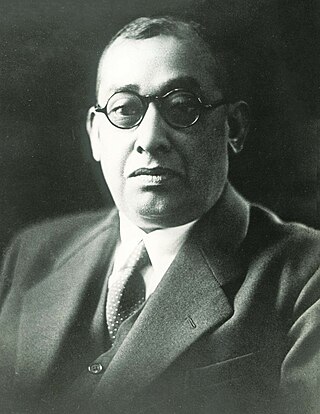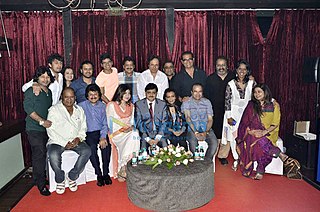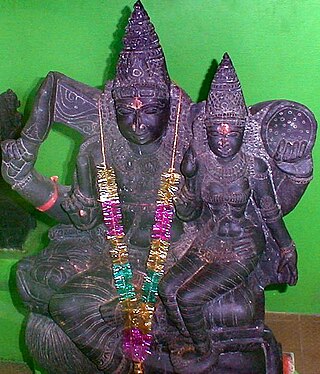People named Sowmya
- S. Sowmya - South Indian Classical singer
- Sowmya Raoh- Playback singer
- Sowmya Rachakonda - Carnatic music singer and Analytics professional
- Sowmya Reddy— Member of Karnataka Legislative Assembly representing Jayanagar, Bangalore
Sowmya is a given name for women. It means "That which is born of Soma". Soma means Chandra, the lunar deity. Sowmya therefore means Budha, because Budha is said to be the son of Chandra. Sowmya also means shubhagrahas or beneficial. It can also mean soft and pure.
In the Vedic tradition, sóma is a ritual drink of importance among the early Vedic Indo-Aryans. The Rigveda mentions it, particularly in the Soma Mandala. Gita mentions the drink in chapter 9. It is equivalent to the Iranian haoma.

Chandra, also known as Soma, is the Hindu god of the Moon, and is associated with the night, plants and vegetation. He is one of the Navagraha and Dikpala.
Nandini is a South Asian female given name. It is derived from the Sanskrit verbal root nand, which means "to rejoice, delight". Literally, nandinī means a woman who brings joy. The name also specifically refers to a daughter, as a daughter brings joy to the family. In the Hindu religion, Goddess Parvati is often addressed by this name. Nandini also refers to one of the eight eternal companions (Ashtanayika) of Goddess Parvati.

Tārā is the Hindu goddess of felicity and sanguineness. She is also the consort of Hindu god Brihaspati, the god of planet Jupiter. According to some Puranas, Tara sired or mothered a child named Budha, the god of Mercury through Chandra and had a son named Kacha through Brihaspati.

In many languages, the names given to the seven days of the week are derived from the names of the classical planets in Hellenistic astronomy, which were in turn named after contemporary deities, a system introduced by the Sumerians and later adopted by the Babylonians from whom the Roman Empire adopted the system during late antiquity. In some other languages, the days are named after corresponding deities of the regional culture, beginning either with Sunday or with Monday. The seven-day week was adopted in early Christianity from the Hebrew calendar, and gradually replaced the Roman internundinum.

Rash Behari Bose was an Indian revolutionary leader who fought against the British Empire. He was one of the key organisers of the Ghadar Mutiny and founded the Indian Independence League. Bose also led the Indian National Army (INA) which was formed in 1942 under Mohan Singh.

The Lunar dynasty is a legendary principal house of the Kshatriyas varna, or warrior–ruling varna mentioned in the ancient Indian texts. This legendary dynasty was said to be descended from moon-related deities.
Bhandari or Bhandary is a surname found in various Hindu castes and communities in India and Nepal. Bhandari means treasurer, keeper of a storehouse. In Punjab, Bhandaris belong to the Khatri caste. In Nepal, the surname is used by both Matwali and Tagadhari Chhetris, as well as Bahuns.
Girish is a masculine Hindu name in India which means "lord of the mountain" in Sanskrit. This is a name of Lord Shiva, given because of his abode in the Himalayan Mountains.
Dikshit is traditionally a Hindu family name.

Sowmya Raoh is an Indian playback singer who has performed in Tamil, Kannada, Hindi and Telugu languages.

Budha is the Sanskrit word for the planet Mercury. Budha is also a god of Planet Mercury.
Biswas is a surname commonly used by the Bengali community of India and Bangladesh. The surname was an honorary title bestowed on persons who were relied upon for the work of accounts, receipts and expenditure.
Khadka, anciently called as Khaḍka, is a surname of Khas/Chhetri caste. Khadga was an ancient Paikelā (warrior) rank along with Thāpā, Rānā and Buḍhā chhetri. Khadka is also used in Magars caste, in Rana magar, i.e. King Mansingh Khadka Magar, before Drabya Bikram Shah became King of Gorkha, khadka Magar used to be king of Kalikot and Gorkha until 1559

Ila or Ilā is a deity in Hindu legends, known for their sex changes. As a man, he is known as Ila or Sudyumna and as a woman, is called Ilā. Ilā is considered the chief progenitor of the Lunar dynasty of Indian kings – also known as the Aillas.
Soumya (Sanskrit: सौम्य), is an Indian name. It is unisexual in nature and is more common as a masculine name in East India and as a feminine name in South and North India. It can also be spelled as Saumya, Sowmya or Somya in South and North India. In West Bengal, it is predominantly a masculine name and spelled as Soumo, Saumya, Soumya,Somya or Soumyo.
A takht, or taḵẖat, literally means a throne or seat of authority and is a spiritual and temporal centre of Sikhism. There are five takhts, which are five gurudwaras that have a very special significance for the Sikh community. Three are located in Punjab whilst the remaining two are located outside of it.
In Hindu texts, the Puru and Yadu Dynasties are the descendants of legendary King Pururavas who was a famous Hindu ruler in the Treta Yuga. Pururavas was the son of Ila and Budha. Some of the dynasties' important members were Yayati, Yadu, King Puru, Turvasu, Druhyu and Anu. According to Hindu mythology, Yayāti was one of the ancestors of Pandavas and the Yaduvamsha.
Budhathoki is a surname of the tagadhari Brahmin/Chhetri group of the Khas community of Nepal. Budhathoki is surname also used by Magars tribe which is one of main 7 clans in magar tribes, i.e., Notable person like Bina Devi Budhathoki magar, Senior artist, folk singer and music composer Prachanda Bahadur Budhathoki Magar. People with the Budhathoki surname reside mostly in Nepal and India. Notable people with this surname include:
Budha or Buda is a surname found in Nepal. Budha was an ancient title for a Paikela (warrior) in the Khasa kingdom. The title has been adapted as family name by Khas and Magar ethnicities. Notable people with the surname include: